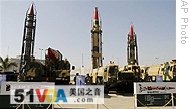US Panel Hears from Experts on Terrorism, Proliferation Challenges Facing Obama
Update Required
To play the media you will need to either update your browser to a recent version or update your
Flash plugin.
By Dan Robinson
Washington
23 January 2009As President Obama announced new initiatives for the Middle East and South Asia on Thursday, congressional lawmakers heard from experts about challenges facing the Obama administration in preventing terrorists from obtaining weapons of mass destruction. President Obama's announcement at the State Department of the appointment of George Mitchell as special envoy for the Middle East, and Richard Holbrooke for Pakistan and Afghanistan, underscored President Obama's pledge to make a strong start on foreign policy. Across town in the House of Representatives, the Armed Service Committee heard from three members of the Commission on the Prevention of Weapons of Mass Destruction Proliferation and Terrorism -- former Senators Bob Graham and Jim Talent, and Harvard University political scientist Graham Allison. In its report last year, the commission warned that without decisive international action, it is more likely that terrorists will use a weapon of mass destruction somewhere in the world by the end of 2013.  |
| Display of Pakistani missiles capable of carrying nuclear warheads (file photo) |
It described Pakistan, Mr. Holbrooke's portfolio, as being at the intersection of nuclear weapons and terrorism -- an ally but one in grave danger of becoming an unwitting source of a terrorist attack on the U.S. with weapons of mass destruction. Saying most analysts believe that a terrorist attack is likely to be launched from Pakistan's Federally Administered Tribal Areas, Bob Graham urged a fundamental change in U.S. policy toward Pakistan "to one of beginning to focus on building the institutions that will stabilize the country and begin to drain off some of the enmity that is currently being evinced toward the U.S. and Western culture, generally." Graham says the Obama administration must shift from what he calls "a fixation on Pakistan's military," to stronger support of Pakistan's civilian institutions. To that end, he and commission member Jim Talent supported greater use by the United States of what is called "soft power" -- combining diplomacy with cultural, educational and other non-military forms of influence. "We think Pakistan is a great test case, a great place to begin that because without the tools of 'smart' or 'soft power,' we're not going to succeed in Pakistan, we believe that very strongly." Graham Allison says the Obama administration faces a delicate balance in Pakistan, where U.S. forces under an order from former President George Bush conducted cross-border attacks against extremists along the Afghanistan border. This was certainly stressful for Pakistan's civilian government, Allison says, but necessary. "If the alternative is to allow the reconstitution of headquarters and training camps for al-Qaida, excuse me [but] that is what happened in Afghanistan before September 11, 2001 and for which we say shame on us, so I think that balance is extremely difficult." Where Iran and North Korea are concerned, Allison referred to hard and unpleasant facts the Obama administration inherits from what he called "ineffective" Bush administration policies. Pyongyang, he noted, is thought to have 10 nuclear weapons, while Iran crossed numerous "red lines" set by the international community regarding weapons-related uranium enrichment. In the background, said Talent, is the reality of terrorists with the determination to obtain weapons of mass destruction. "We know that the terrorists want to get these weapons, we know that they have tried to get these weapons and we know that they are sophisticated enough organizationally to get the capabilities." In its report last year, the commission said terrorists are more likely to be able to obtain and use a biological weapon than a nuclear weapon, and urged more aggressive steps by the United States to limit the proliferation of biological weapons. Amid concerns that terrorists could obtain biological capability from countries possessing the technology, Graham said "one of the immediate steps that the new administration should take would be to convene a conference of exactly those countries as well as the more traditional First World countries with biological capabilities to start from the premise that we all are at risk." Where the safety of Pakistan's nuclear arsenal is concerned, Graham Allison referred again to the delicate balance requiring the United States to encourage and motivate a government and military to fight extremist groups, while trying not to contribute to political instability. Allison recalled a conversation he had with former Pakistani President Pervez Musharraf. "He said, 'Don't worry, everything is under 100 percent control, [it's] not conceivable that something could be lost.' And on one of these occasions, he had just two weeks before come within a second-and-a-half of being assassinated. And the prevention of the assassination was only possible by some technical cooperation from the U.S. government. And I said to him, 'How likely is it that your nuclear weapons are more secure than the president of the country?'" Wednesday's House committee session was only the first of numerous hearings expected in coming months, focusing on challenges facing the new Obama administration.
